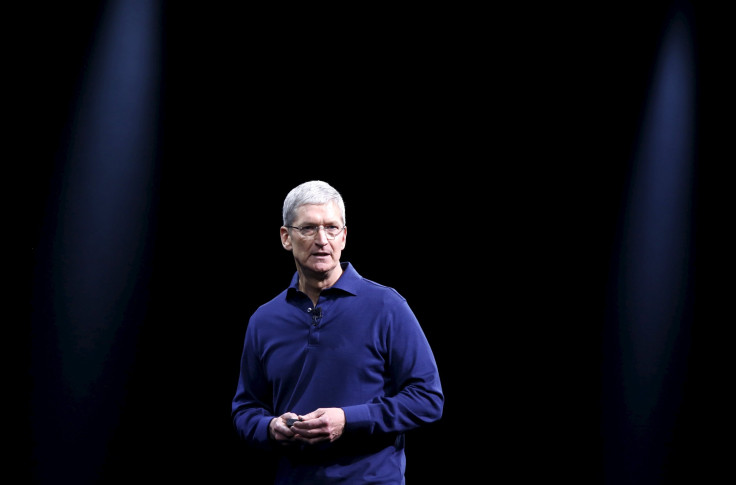Apple Inc. CEO Tim Cook Tells Employees Civil Liberties At Stake In Privacy Fight

In a letter to employees Monday Apple CEO Tim Cook said the data and civil liberties of hundreds of millions of people were at risk if it were to submit to the Federal Bureau of Investigation's demand to make a backdoor into the iPhone.
"This case is about much more than a single phone or a single investigation," he wrote. "At stake is the data security of hundreds of millions of law-abiding people, and setting a dangerous precedent that threatens everyone’s civil liberties."
With the Department of Justice trying to compel Apple to create the software tool whether they want to or not, the iPhone maker has turned to the court of public opinion to drum up support against weakening the security and encryption features of it smartphone. In the letter, Cook also urged the FBI to drop its order to get Apple to unlock the smartphone, noting that in doing so would set a "dangerous precedent."
The two parties have both double-down on their positions regarding gaining access to the iPhone 5C used by Syed Rizwan Farook, one of the two killers in the San Bernardino shootings. The FBI maintains that its legal order is “quite narrow” and “simply wants the chance” to guess the phone’s passcode without it self-destructing, according to a letter published by FBI director James Comey. Apple maintained that not building a code to get into the iPhone was a matter of civil liberties and that turning back the clock on its software is a terrible idea.
“Apple is a uniquely American company," Cook wrote. “It does not feel right to be on the opposite side of the government in a case centering on the freedoms and liberties that government is meant to protect.”
But despite its strong position, Apple’s CEO acknowledged that there’s still room for dialog and discussion on the implications of encryption with a “panel of experts on intelligence, technology and civil liberties to discuss the implications for law enforcement, national security, privacy and personal freedoms.”
In addition to the letter, Apple also posted a page on its website for its customers, addressing some of the frequently asked questions around why it chose not to comply with the FBI order.
Read the full letter below:
Subject: Thank you for your support
Team,
Last week we asked our customers and people across the United States to join a public dialogue about important issues facing our country. In the week since that letter, I’ve been grateful for the thought and discussion we’ve heard and read, as well as the outpouring of support we’ve received from across America.
As individuals and as a company, we have no tolerance or sympathy for terrorists. When they commit unspeakable acts like the tragic attacks in San Bernardino, we work to help the authorities pursue justice for the victims. And that’s exactly what we did.
This case is about much more than a single phone or a single investigation, so when we received the government’s order we knew we had to speak out. At stake is the data security of hundreds of millions of law-abiding people, and setting a dangerous precedent that threatens everyone’s civil liberties.
As you know, we use encryption to protect our customers — whose data is under siege. We work hard to improve security with every software release because the threats are becoming more frequent and more sophisticated all the time.
Some advocates of the government’s order want us to roll back data protections to iOS 7, which we released in September 2013. Starting with iOS 8, we began encrypting data in a way that not even the iPhone itself can read without the user’s passcode, so if it is lost or stolen, our personal data, conversations, financial and health information are far more secure. We all know that turning back the clock on that progress would be a terrible idea.
Our fellow citizens know it, too. Over the past week I’ve received messages from thousands of people in all 50 states, and the overwhelming majority are writing to voice their strong support. One email was from a 13-year-old app developer who thanked us for standing up for “all future generations.” And a 30-year Army veteran told me, “Like my freedom, I will always consider my privacy as a treasure.”
I’ve also heard from many of you and I am especially grateful for your support.
Many people still have questions about the case and we want to make sure they understand the facts. So today we are posting answers on apple.com/customer-letter/answers/ to provide more information on this issue. I encourage you to read them.
Apple is a uniquely American company. It does not feel right to be on the opposite side of the government in a case centering on the freedoms and liberties that government is meant to protect.
Our country has always been strongest when we come together. We feel the best way forward would be for the government to withdraw its demands under the All Writs Act and, as some in Congress have proposed, form a commission or other panel of experts on intelligence, technology and civil liberties to discuss the implications for law enforcement, national security, privacy and personal freedoms. Apple would gladly participate in such an effort.
People trust Apple to keep their data safe, and that data is an increasingly important part of everyone’s lives. You do an incredible job protecting them with the features we design into our products. Thank you.
Tim
© Copyright IBTimes 2025. All rights reserved.




















